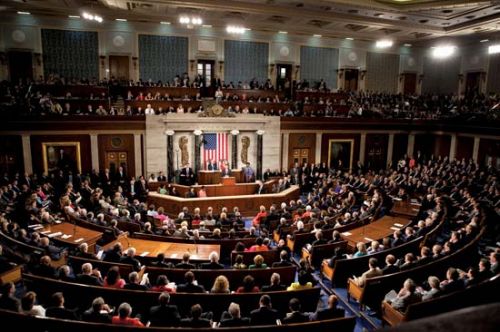News | December 19th, 2017
 WASHINGTON D.C. – As the Republican $1.5 trillion tax bill headed for a final vote Tuesday, opposition to the bill, known as the Tax Cuts and Jobs Act, was growing. The House approved the bill Tuesday afternoon, by a vote of 227-203, but questions were raised soon after the vote.
WASHINGTON D.C. – As the Republican $1.5 trillion tax bill headed for a final vote Tuesday, opposition to the bill, known as the Tax Cuts and Jobs Act, was growing. The House approved the bill Tuesday afternoon, by a vote of 227-203, but questions were raised soon after the vote.
The bill is expected to pass in the Senate this week, and President Donald Trump has promised to sign it into law by Christmas. If passed, the bill would mark the first major legislation passed during Trump’s first year in the Oval Office. Late Tuesday night Vice News reported the House had to re-vote after the Senate votes due to deficiencies in the bill. The New Yorker Magazine called the bill unworkable; Bloomberg Politics cries procedural hiccup.
Some of the issues in the bill as it stands now include 529 tax-advantaged accounts to cover expenses for home-schooling children, and schools that would be excluded from a new excise tax on private universities’ endowments above a certain threshold, according to Bloomberg Politics.
More than half of Americans, 57 percent, on both sides of the political aisle, reported that the proposed cuts, called the most sweeping tax rewrite in decades, would not help their family’s financial situations, according to a December 6 Gallup News poll.
Despite criticism, Republicans are promoting the benefits of the tax cuts -- to be tapered off by 2027 -- and Democrats are attacking the bill as a $49.4 billion gift for corporations and the wealthy.
The bill in its current form will raise taxes on individuals by $83 billion in 2027, Senator Heidi Heitkamp (D-ND), said.
“It’s Congress’s job to put our country on a strong path forward,” Heitkamp said. Heitkamp is also a former North Dakota tax commissioner. “Unfortunately, this bill does the opposite. It will put nearly $1.5 trillion on the country’s credit card, passing those costs on to our children and grandchildren. And it will increase costs to most North Dakotans in the long-term, while corporations and the wealthy reap permanent benefits.”
The bill was hastily crafted and pushed to the legislature by one party, Heitkamp said.
Congressman Kevin Cramer disagreed.
“At the beginning of this year, Congress and the Trump Administration pledged to enact meaningful tax reform, making American businesses globally competitive again, and giving middle-class taxpayers the tax cut they deserve,” Cramer said.
A family of four earning $73,000 a year will receive a $2,059 tax cut, Cramer reported on December 15. “Without questions, the final version of the Tax Cuts and Jobs Act released… will save Americans thousands of dollars in taxes. Farmers will save money; local businesses will save money; young working families will save money; single individuals will save money; nearly everyone in America will keep more of their hard-earned money. This is a win for the American people, and people should expect to see more money in their paychecks beginning February 2018.”
Ben Hanson, a Fargo real estate agent who is running against Cramer for the state’s only seat in Congress, said he would vote no on the bill.
"This bill betrays seniors, farmers and ranchers, college students and the workers who live off the paychecks they earn,” Hanson said. “Kevin Cramer can claim that this bill is good for our state, but saying it over and over doesn't make it so. He just voted to raise taxes on most North Dakotans and cut critical programs for those who depend on them.
"North Dakotans deserve a congressman who puts people over profits, and Kevin Cramer is not that person. His vote harms families, harms our communities and it harms our state."
Senator John Hoeven (R-ND), said the bill’s tax cuts, coupled with regulatory relief, will empower the economy to grow and increase government revenues.
“We worked hard to ensure the tax relief bill works for North Dakota,” Hoeven said. “The legislation lowers rates across the board for individuals and families, enabling hard-working Americans to keep more of their paychecks. At the same time, it lowers rates and provides relief for small businesses, including our farmers and ranchers.
According to Hoeven’s explanation of the bill, the tax cuts will provide more than $2,059 for a median-income family of four, Americans will not be taxed on the first $12,000 of income for individuals, $24,000 for married couples, and $18,000 for single parent with dependents.
Child tax credits are doubled to $2,000 per child, and child and dependent tax credits are left alone. The bill also continues deductions for student loan interest and tuition waivers, medical expenses, charitable contributions, and home mortgage interest.
Heitkamp’s description of the bill couldn’t be more different: the Tax Cuts and Jobs Act will provide permanent tax cuts to corporations and large tax cuts for the wealthy, while the middle-income families lose out in the long run. The gap between large and small businesses will widen, just as the wealth between today’s rich and poor will be exacerbated.
“The bill will essentially punish smaller businesses that can’t afford to pay high-priced tax attorneys and accountants to exploit loopholes and glitches in the rules,” Heitkamp said. “The largest loopholes enable the wealthy to declare their income as business income to benefit from the new lower corporate tax rates.”
The tax cuts could also continue the American trend of shifting income and companies overseas instead of creating more jobs in America, Heitkamp said. Senior citizens may also see their taxes rise with inflating health care premiums.
“It will also drastically increase the nation’s debt by nearly $1.5 trillion, which could lead to $400 billion in cuts to Medicare over 10 years, and slash other programs that support seniors.”
Instead of helping farmers and ranchers, as Cramer and Hoeven maintain, middle-income families in rural America will lose out after “modest tax decreases” disappear after 2025.
“The wealthy and corporations will reap permanent rewards,” Heitkamp said.
Millennials will also inherit a massive national debt. “The structure of the tax bill will be particularly devastating for young men and women entering the workforce who will face a nearly $1.5 trillion bill in the next 10 years, just as they are entering their prime working years,” Heitkamp said.
“Although millennials will be paying for these tax cuts, they won’t see much in terms of tax reductions, because these cuts are geared toward higher earning workers who are more developed in their careers. And by the time most millennials will be entering into their prime earning years, the tax cuts will be completely phased out.”
October 13th 2025
October 13th 2025
October 6th 2025
September 29th 2025
July 29th 2025
_(1)__293px-wide.jpg)
__293px-wide.jpg)

_(1)__293px-wide.png)

